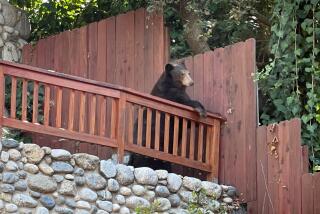Good morning, L.A.
Radio is infamous as a mercurial medium in which longtime formats can change without warning and jobs can come and go with such regularity that station call letters spill across DJ resumes like alphabet soup.
So how to explain the stable of Southland morning hosts deep into their second decades, or longer, on the air?
For 19 years, Mark Thompson and Brian Phelps have broadcast their antics on KLOS-FM (95.5), while fans of talk station KFI-AM (640) have awakened to Bill Handel since 1993. Kevin Ryder and Gene “Bean” Baxter have been rousing party people for 16 years from their KROQ-FM (106.7) perch, and the amiable duo of Mark Wallengren and Kim Amidon on KOST-FM (103.5) have held their morning post for 21 years.
“We bought into that thing that radio was flaky. If we had known it was going to go on this long, I’d have bought a bigger house,” Amidon quips.
But no one knew. At the beginning of their run at KOST, Wallengren recalls, “every 12 weeks, they had an option to get rid of us.”
Likewise, Handel says he started his morning show at KFI with a one-year contract but didn’t think he’d last that long.
“The formula of finding a show, making it work and keeping it compelling is pure alchemy,” he said.
“If you combine the right people with the right type of format, something just clicks,” Handel said. “They’ve found their audience and their audience has found them. And then with their audience, they become as comfortable as old shoes. It really is the comfortable relationship you have with old friends.”
And that’s the first key to explaining the longevity: Once the bond is made, stations are inclined to stick with it, favoring consistency over a change that might produce higher ratings but could just as easily produce lower numbers.
The Los Angeles-Orange County radio market is a big one -- the nation’s second largest, trailing only New York -- and there are plenty of listeners to go around, segmented by their tastes.
Thus, enthusiasts of Kevin & Bean’s search for Miss Double D-cember might not enjoy Handel’s riffs on current events, nor would fans of Mark & Kim’s reveries about hot chocolate and Christmas music be likely to tune in to a chat between rapper Snoop Dogg and Kurt “Big Boy” Alexander, the morning DJ at KPWR-FM (105.9) for the last nine years.
Wallengren, however, identified a common thread among the long-running shows.
“Without being modest -- talent. The cream rises to the top,” he said. “Success sticks around, and mediocrity leaves pretty fast. You’ve got some really great morning-show talent in this city. The market draws it.”
And keeps it. That’s the second important factor in explaining longevity here: Why would they go somewhere else? New York has a larger audience, but L.A. can open doors elsewhere in the entertainment industry. Mark and Brian, Kevin and Bean, Bill Handel and Rick Dees have all appeared in movies and television, and, in the case of Big Boy, even a video game.
“It’s a privilege to be in a market this size,” said Jimmy Steal, program director for KPWR and KMVN-FM (93.9) and vice president of programming for their parent company, Emmis Communications.
“I don’t think there are too many people on in L.A. who are saying, ‘I can’t wait to get to Saginaw,’ or, ‘I can’t wait to get to Pocatello.’ Once you make it in L.A., I would think working in about any other market would be anticlimactic.”
Behind the levity on-air, morning radio is serious business. Because most listeners tend to stay where they start the day, the ratings of an entire radio station can rise or fall with the morning drive.
“The investment you make to be competitive in morning drive is the biggest investment you make for the radio station,” said Kevin Weatherly, program director for KROQ and KCBS-FM (93.1) and vice president of programming for their corporate parent, CBS Radio. “You put the time and energy into a show you believe in. Once you’re in the zone, and once you have a show that has some traction, you can have a really long run. Listeners are creatures of habit.”
Because of that, shows that don’t work disappear pretty quickly, while those that do tend to have long life spans -- barring a change in format or in management’s opinion of a host. The king of morning drive in L.A. had been Dees, who debuted on KIIS-FM (102.7) in 1981. But management dumped him in 2004 for a hot new thing, “American Idol” host Ryan Seacrest.
That year was hard on morning listeners’ habits up and down the dial. National Public Radio booted host Bob Edwards from “Morning Edition” after nearly 25 years, and tens of thousands of angry listeners complained about his ouster. Ken Minyard retired from his show at KABC-AM (790), where he had held court since 1973, except for a two-year foray at KRLA-AM (1110) earlier this decade. And onetime ratings leader Pepe Barreto, after 18 years of mornings at Spanish-language KLVE-FM (107.5), joined rival station KXOL-FM (96.3) in 2004. But he lost his job there when KXOL became a bilingual reggaeton and hip-hop station last year.
Ironically, an abrupt format change brought Dees back to the morning air, after Emmis switched country station KZLA-FM to KMVN’s rhythmic pop this year. Steal said numerous listeners have thanked him for returning Dees to Southland airwaves.
“We knew there was a huge chunk of the L.A. audience that was disenfranchised with him being off the air,” he said. “His voice is almost like comfort food for your ear. He’s been a part of Southern California life.”
And although Steal said his KMVN and KPWR hosts, Dees and Big Boy, might “at first blush” seem very different from each other, “the ones who understand how to build that emotional bond with their audiences are the ones who have longevity.”
Barreto echoed that recipe for success: “First of all, get a good radio station, a good manager, always give your best, be creative, respect your audience, and the rest will come to you.”
Station executives desire that symbiosis between the talent and their audience, but not out of sentimentality, according to Handel.
“Decent ratings and making money -- that’s how loyalty is spelled in the world of radio,” he said. “Sell our commercials and keep the ratings up.
“I’ve often wondered about morning shows that do nothing, and do nothing for years.” He’s put the question to program directors: “How can they keep that show on?” he asks. “The answer is, ‘Because the next one might do worse.’ ”
KCBS’ Weatherly agreed. “There’s so much revenue in this market, that a tenth of a [ratings] point can mean millions,” he said. “Even if you have a show that does mediocre ratings, you could do well with that.”
More to Read
Sign up for Essential California
The most important California stories and recommendations in your inbox every morning.
You may occasionally receive promotional content from the Los Angeles Times.










